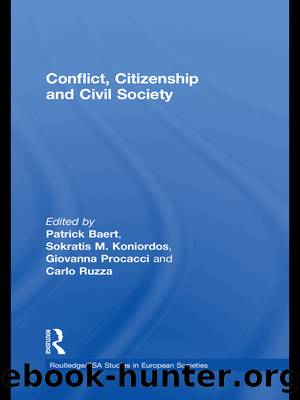Conflict, Citizenship and Civil Society by unknow

Author:unknow
Language: eng
Format: epub
ISBN: 9781135259679
Goodreads: 17513052
Publisher: Routledge
Published: 2009-12-16T00:00:00+00:00
The Portuguese case
The access of foreign residents to full civic and social citizenship is guaranteed in the Portuguese fundamental law. In fact, the Constitution is framed, as regards resident foreignersâ rights, under the principle of equity (Art. 15) â which means that foreign residents have the same rights and are subject to the same duties as Portuguese citizens â and the principle of equality (Art. 13) â which means that everyone has the same social dignity and is equal before the law. Furthermore, the main human and social rights are specified in the Constitution â life (Art. 24), good reputation (Art. 26), education (Art. 74), health (Art. 64), work (Art. 58 and Art. 59), housing (Art. 65), justice, legal representation in court (Art. 20), and social security (Art. 63) â and thus cannot be curtailed by ordinary law. But, while the guarantee of some rights (life, good reputation, justice and legal representation) is universal, the remaining rights are reserved. Although disconnected from nationality, social and economic citizenship rights are, in the Portuguese case, linked to residency status and to the social mode of economic incorporation, not to personhood. In fact, the social rights specified in the Constitution â education, health, work, housing and social security â only pertain to legal residents, and the right to several relevant social security entitlements (e.g. unemployment benefits, or a retirement pension) is directly dependent on formal employment. The exceptions to this rule are the extensions of health and education rights to illegal immigrants and asylum seekers.1 This extension, which took place in the early 2000s, was justified as much by human rights as by public health concerns (in the case of health) and the need for integration (in the case of education).2
Furthermore, Portugal signed all major international instruments on human rights and on migrant worker protection, and has also signed bilateral agreements extending social and various political rights to the main extra-communitary immigrant groups in Portugal, namely Brazilians and immigrants from the Portuguese-speaking African countries (from now on referred to as the PALOP).3 Thus, it is taking on in the international arena the responsibility for ensuring human rights and migrant worker protection described in the above mentioned documents, and the countryâs political will to discriminate positively in favour of the nationals of those countries, which once comprised the Portuguese colonial empire.
In sum, the existing legal framework bars access to social and economic rights to all immigrant workers and their dependents who do not have lawful residency status and to all those who, irrespective of their residency status, are incorporated in Portuguese society in the informal economy. Or in other words, from the legal-institutional point of view, we may say that the degree of exclusion from social and economic rights is a function of the level of irregular permanence and/or of economic informality displayed by the foreign population in the country4 â quite a relevant fact, since this exclusion is extremely high in Portugal. In fact, more than half of the foreign resident population experienced
Download
This site does not store any files on its server. We only index and link to content provided by other sites. Please contact the content providers to delete copyright contents if any and email us, we'll remove relevant links or contents immediately.
| Bahrain | Egypt |
| Iran | Iraq |
| Israel & Palestine | Jordan |
| Kuwait | Lebanon |
| Oman | Qatar |
| Saudi Arabia | Syria |
| Turkey | United Arab Emirates |
| Yemen |
Empire of the Sikhs by Patwant Singh(23084)
The Wind in My Hair by Masih Alinejad(5095)
Rise and Kill First by Ronen Bergman(4788)
The Templars by Dan Jones(4689)
The Rape of Nanking by Iris Chang(4211)
12 Strong by Doug Stanton(3548)
Blood and Sand by Alex Von Tunzelmann(3203)
Babylon's Ark by Lawrence Anthony(2676)
The History of Jihad: From Muhammad to ISIS by Spencer Robert(2628)
No Room for Small Dreams by Shimon Peres(2368)
Inside the Middle East by Avi Melamed(2356)
The Turkish Psychedelic Explosion by Daniel Spicer(2356)
Gideon's Spies: The Secret History of the Mossad by Gordon Thomas(2350)
Arabs by Eugene Rogan(2299)
The First Muslim The Story of Muhammad by Lesley Hazleton(2271)
Come, Tell Me How You Live by Mallowan Agatha Christie(2260)
Bus on Jaffa Road by Mike Kelly(2159)
1453 by Roger Crowley(2030)
Kabul 1841-42: Battle Story by Edmund Yorke(2029)
